CA outlines new steps to boost internet connectivity
By Noel Wandera, December 27, 2024The Communications Authority of Kenya (CA) has proposed the expansion of Tier-3 internet service providers (ISPs) scope to three counties in a move expected to significantly improve their commercial viability and attractiveness to investors.
At the same time, it also intends to introduce a new Tier 4 category to encourage local investment and foster competition by simplifying market entry for smaller operators.
These initiatives, outlined in the report titled “Review of The Telecommunications Market Structure,” are among a raft of new proposals aimed at addressing the growing demand for internet services, particularly in underserved areas where reliable connectivity is essential for economic development.
“It is recommended that in order to make the NFP-T3 Licence more commercially viable… its scope of coverage be increased from one county to three counties,” the CA proposal stated in part.
Currently, NFP-T3 licensees in Kenya use terrestrial fixed and mobile networks, including wire, radio, optical, and other electromagnetic means for signal transmission. These technologies are employed to establish communication infrastructure within a specific regional scope, limiting their coverage to a single geographical area.
The demand for internet services in Kenya has been rising due to the growth of e-commerce, remote work, and digital education. To address this, the government is implementing several initiatives to improve internet connectivity, especially in rural areas.
These include constructing 100,000 km of fiber-optic cable across the country, rolling out over 25,000 free public Wi-Fi hotspots, and establishing 1,450 digital hubs called “Jitume” to promote digital literacy and create online jobs2. These efforts aim to bridge the digital divide and ensure more Kenyans can access reliable internet services.
Tier 3 ISPs play a vital role in Kenya’s telecommunications landscape. They are primarily responsible for delivering internet access to end-users within specific geographic areas, often serving residential and small business customers.
Real-time transactions
By providing reliable and affordable internet connectivity, these providers help facilitate real-time transactions and support cloud-based operations. The CA’s proposal recognises their importance in enhancing digital inclusion and economic growth across the country.
According to CA, the NFP-T3 licensees that exceed these proposed requirements will be allowed to continue operating until their license terms expire, at which point they must apply for and convert to an NFP-T2 license.
CA says the Tier 4 license will limit operations to one county and requires applicants to simultaneously apply for a County ASP License. An NFP-T4 licensee will have the opportunity to upgrade to a fully-fledged NFP-T3 license upon approval from the authority.
The proposed regulatory changes also include allowing NFP-T3 licensees to establish satellite systems and provide satellite services, which was previously restricted.
“NFP-T3 licensees should be allowed to establish satellite systems… provided they comply with the geographical scope principle,” CA stated.
This adjustment aligns with technology-neutral principles outlined in the Universal Licensing Framework (ULF), enhancing service delivery capabilities for these providers. To ensure compliance with these new regulations, the CA plans to implement a robust enforcement mechanism based on licensee declarations and inspection activities.
The proposed regulatory fees for NFP-T4 include an application fee of Sh1,000, an initial fee of Sh15,000, and an annual operating license fee based on gross turnover. Similarly, the County ASP License will have its own set of fees aimed at supporting sustainable growth within the telecommunications sector.
CA says these comprehensive proposals are designed not only to structure the telecommunications market but also to promote sustainable growth within the industry.
